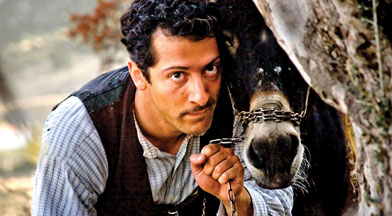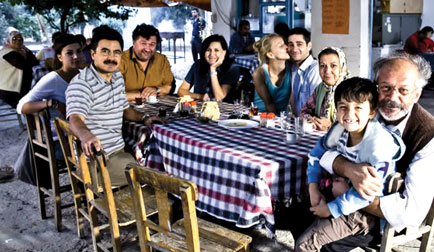|
European Film Festival Reviews:
Almanya - Wilkommen in Deutchland
(Welcome to Germany)
By Madelene Wightman
[Part 1]
Last weekend, the European Film Festival opened in Colombo with
‘Almanya - Wilkommen in Deutchland (Welcome to Germany)’.
The film marks the cinematic debut of Yasemin Samdereli. Born in
Germany in 1973, the film maker studied at the College of Film and
Television in Munich from 1993 to 2000. Between 1994 and 1999, she was a
freelancer for Bavaria Film and worked as an assistant director on a
number of international productions. In 2002, she directed a television
comedy and was also a co-writer for a TV series.
 |
|
A scene from the film |
The central question in 'Almanya - Welcome to Germany', is “Am I
German or Tukish?”. It is a surprisingly engaging and entertaining drama
about a Turkish family who have lived in Germany since the 1960s. The
film is essentially told from the perspective of Canan, a college-age
girl eager to share family lore with her 6 year-old cousin Cenk. The
film bounces engagingly between past and present. In 1964, a mustachioed
charmer named Hüseyin leaves his wife and children in Turkey to join the
ranks of immigrants enabling Germany's "economic miracle." Bringing his
family over as soon as he gets his feet under him, he then watches as
his four children become thoroughly German. Decades later, the gruffly
lovable patriarch arranges to buy a run-down house in their old village
and shames his descendants into joining an all-family mission to
renovate it.
When the grandfather announces he has bought a summer house in
Turkey, just after he and his wife have finally become German citizens,
a journey starts, taking the family through their past and their two
cultures. We see how the identities of grandfather and grandmother have
changed so much since they first left Turkey for Germany, where once
they identified totally as Turkish, they now feel just as Turkish inside
but have become totally used to life in Germany and find elements of
Turkey quite alien now they return. At the same time their grandson
finds he isn't accepted by his school friends - he's neither properly
German nor Turkish.
The production is well structured and filmed, using a documentary
approach to the historical elements of the story and with wonderful
surreal touches to highlight the emotional journey of the characters.
There are dream sequences including grandfather's nightmare about what
German citizenship might involve. There are also some interesting
details, such as an embroidered handkerchief that grandfather had given
to grandmother when he had first gone to Germany, which add subtlety and
depth to the story.
Situations faced by Alymanya’s immigrant Turkish family may be
specifically German, but at the centre of Yasemin Samdereli’s amenable
drama, which she co-wrote with her sister Nesrin Samdereli, is an
eloquently-expressed appeal for understanding and tolerance which
shouldn’t fall on deaf ears outside its homeland.
‘Almanya’ has an appealing freshness to its writing and performances,
which carries the viewer over some of its more endearing qualities (a
lisping six-year-old boy; performers who address younger versions of
themselves on screen, giving a blue-sky vision of the Eastern
Mediterranean).
The film seeks to present Turkey to wider audiences in a
less-threatening manner than its often-forbidding domestic cinema. It
also manages to gloss over over some of the grittier aspects of
immigrant life in the West, whilst still making valid comments It seems
that Sandereli’s background in television has led her to make a play for
wider audiences.
 |
|
A scene from the film |
This certainly isn’t life on the mean streets of Hamburg. Huseyin may
work building the roads, but we get few glimpses of his sweat and toil.
The language confusion is neatly dealt with linguistically by Samdereli,
and there are some sweetly funny moments involving an attempt at
Christmas and the terror of seeing Christ on a cross. Performances are
beguiling, from the children/young parents and their older counterparts
alike, to the point where, when the Samdereli sisters start to tug
energetically on the viewer’s heartstrings, resistance is futile.
Technically this is a studio-bound piece, leavened by period newsreel
footage, and only visually comes to life on location in Turkey, and even
then in a picture postcard way. Some sequences, including a dream
interlude in a passport official’s office, demonstrate Samdereli’s roots
in scripting TV comedy.
While Samdereli effectively mines little culture-clash details for
their comic value (Western toilets are baffling, as is Christianity,
which one Turkish child amusingly interprets as sanctified cannibalism),
the director/co-writer refuse to acknowledge any serious hardship or
angst. A bit of schoolyard teasing is the biggest challenge immigrants
face here. When unrelated difficulties arise, the film's blanketing pep
hardly allows them to sink in. Canan is hiding an unexpected pregnancy,
for example, and it feels about as weighty as if she had dented Mom's
car.
The film's core performances walk the line between charm and
sappiness, with Vedat Erincin(as the elder incarnation of Hüseyin)
offering just enough wryness to balance the bland cuteness of younger
costars. Nothing in his friendly-bear demeanor can inject gravitas in a
film designed solely to congratulate a wave of successful workmen and
their descendants, but few in this film's demographic will have a
problem with that.
If immigration has been the source of major strife in Europe, you'd
never know it from Almanya, as it has an overpowering feel-good vibe
which has little room for real-world hardship. Thoroughly commercial,
the film should appeal to Turkish immigrants in particular, but its take
on old country/New World identity issues is general enough to resonate
with other communities as well.
|

